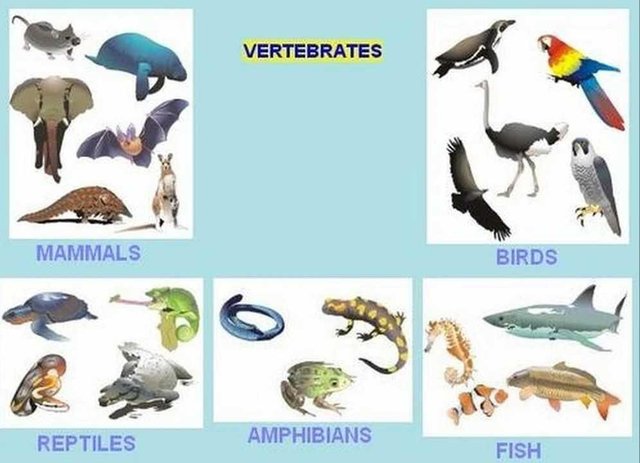Vertebrate Animal Understanding and Groups
Vertebrate Animal Understanding and Groups we can learn in education schools in general. Vertebrate animals themselves are vertebrate animals and have a more perfect body structure than invertebrate animals.
Vertebrate animals have an arrangement as a place for gathering nerve cells. The arrangement has an extension of the nerve bundles of the brain. The rope is not owned and not vertebrate. It has a circulatory system in these vertebrate animals and the way it works is perfect, because blood is centered in the heart organs with other vessels.
Not a few questions that arise from what is meant by vertebrate animals? These vertebrate animals are animals that have no back or spine. The meaning of vertebrates itself is a subfilum of chordate and includes all animals with arranged spines.
While vertebrate or vertebrate phylum groups consist of:
• Pisces or fish
• Amphibians
• Reptiles
• Aves
• Mammals
The definition and group of Pisces vertebrate animals usually start from jawless fish, cartilaginous fish and hard-boned fish. Examples of these vertebrates are quite a lot, such as sea eels, sharks, stingrays and cone fish.
Whereas amphibians are animals whose lives are in 2 realms, land and water. Reptiles breathe using the lungs and their bodies are covered by horns and scaly skin. Mammals are vertebrate animals that have mammary glands, hair and not feathers. So vertebrate animals that do not belong to the mammal class start birds, fish, lizards, snakes, turtles and crocodiles.
General Characteristics of Vertebrates
Vertebrates themselves have a role, including general characteristics. Has benefits in human life. This general characteristic also depends on the vertebrate group itself.
The definition and group of Pisces vertebrate animals include the names of vertebrate animals that have cold-blooded characteristics, gill breathing, the body consists of a head, the frame is composed of real bones, the body is covered with scales, has a lateral line, the heart consists of 1 porch and 1 chamber.
The role of vertebrates in this group is:
become a source of animal protein
• oil as a source of vitamin A
• as a pet
In amphibians have the characteristics of a body that is covered in slimy skin, cold blooded, has a heart with 3 rooms, has 2 pairs of legs, eyes have membranes, breathing with gills or new lungs and breed release eggs. This class of amphibian vertebrates has a role in human life as a source of animal protein and as a natural pest control.
Vertebrate Digestive System
The digestive organs in these vertebrate animals are in accordance with the group. Excretory systems in vertebrate animals are usually in the form of gills, skin and kidneys. For the digestive system in fish in the oral cavity, there are cone-shaped teeth in the oral cavity. There are also liver and gallbladder that have their respective functions.
Same as understanding and vertebrate animal groups, liver function is also very important. Can produce bile stored in the gallbladder to help digest the fat. While the gallbladder functions to store bile and will be channeled to the intestine. The digestive system in amphibian groups is usually almost the same as fish. Consists of the digestive tract and digestive glands.
For the digestive system the reptile group consists of the digestive tract and digestive gland. But the digestive system in ruminant animals is usually longer and more complex. While fertilization that occurs in vertebrate animals usually occurs externally, male sex cells and ovum cells will fuse in the female parent's body.
 .
.
@ksiaceh
(COMMUNITY STEEMIT ACEH)

